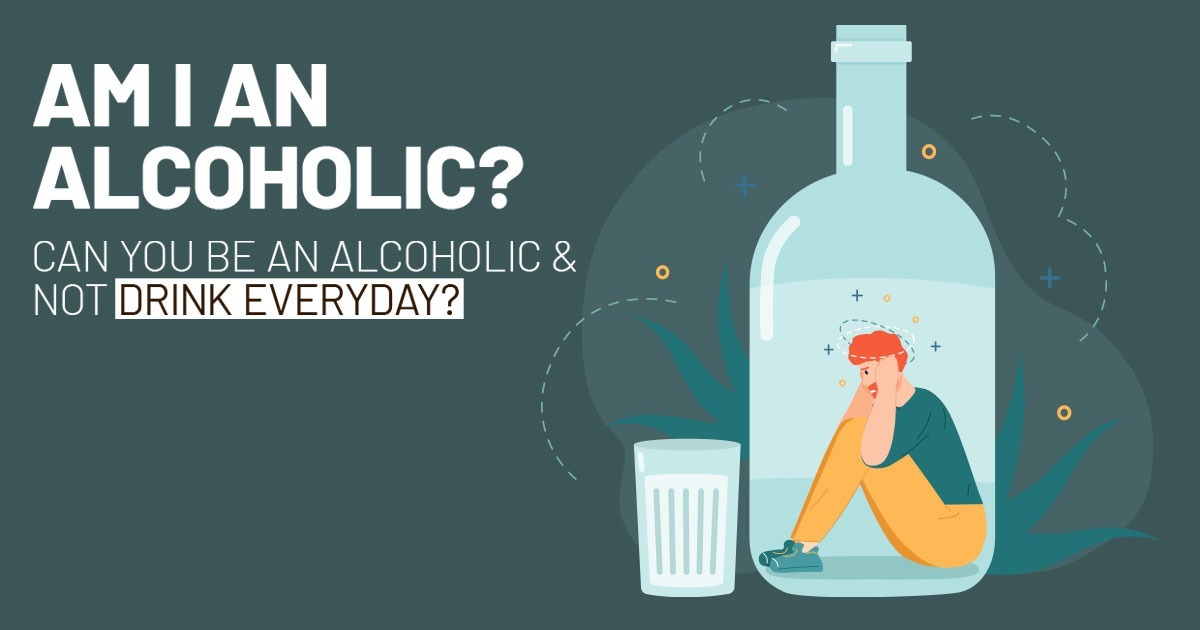
Do all alcoholics drink every day?
The answer might surprise you. While some individuals struggling with alcoholism drink daily, others may engage in binge drinking, heavy drinking, or irregular but equally problematic patterns of alcohol use. Alcoholism doesn’t always look the same, and these variations can make it difficult to recognize when drinking has crossed the line into dependency.
Read more below to get the break-down of the signs of alcoholism, explores the differences between binge and heavy drinking, and offers insights to help you identify when alcohol use might be a cause for concern. Whether you’re questioning your own habits or worried about someone you care about, understanding these patterns is the first step toward finding clarity and support.
What Is Binge Drinking?
Binge drinking is defined by the National Institute on Alcohol Abuse and Alcoholism (NIAAA) as consuming enough alcohol in a short time to raise your blood alcohol concentration (BAC) to 0.08% or higher—typically four drinks for women or five for men within about two hours. It’s more common than people think and often goes overlooked because it doesn’t always resemble “typical” alcohol dependence.
Why It Matters
Many women may not drink daily but still engage in harmful drinking patterns that impact their mental, emotional, and physical health. Binge drinking can lead to risky decisions, worsened mental health, strained relationships, and a greater likelihood of developing alcohol dependence over time. If you’re wondering, “Do I have a problem if I only drink heavily once or twice a week?”—that’s a valid concern. It’s one of the most overlooked questions when it comes to understanding alcohol misuse.
Understanding Alcoholism
Alcoholism is now more commonly known as alcohol use disorder. When you have an AUD, you have a psychological and physical need to consume alcohol, despite adverse effects on your life. There are millions of deaths around the world each year because of harmful alcohol use.
The National Institute on Alcohol Abuse and Alcoholism says an AUD is problematic drinking that becomes increasingly severe. If you have an AUD, you can’t stop drinking even if you want to. Your use of alcohol becomes out of your control. Much of your time is spent thinking about can you be an alcoholic and not drink every day.
Symptoms of an AUD include:
- Drinking secretly or when you’re alone
- The inability to limit how much alcohol you have
- Having routines that center around alcohol
- Loss of interest in things you once enjoyed
- Cravings or intense urges to drink
- Feeling irritable when your normal drinking time comes if you can’t have any alcohol
- Hiding alcohol
- Developing a tolerance and needing more alcohol the feel the effects
- Signs of physical dependence such as sweating, shaking, or nausea when you aren’t drinking
If you have an alcohol use disorder, drinking is your top priority. You may have signs of psychological addiction to alcohol without physical dependence. If you have a physical dependence, which can take years to develop, you have signs of withdrawal if you don’t drink or cut back. For a diagnosis of alcoholism, at least three of the following occur within the past 12 months:
- Tolerance: You need more significant amounts of alcohol to feel intoxicated.
- Withdrawal: As we talked about, if you have a physical dependence on alcohol and try to stop drinking, you may have withdrawal symptoms like nausea or anxiety.
- Drinking more than intended: You might find that you drink more drinks at any given time than you intend, or you drink for a more extended period.
- Unsuccessful attempts to quit: Have you tried to cut down or quit alcohol and found yourself unsuccessful in doing so? A potential symptom of alcoholism is the ongoing desire to cut down but the inability to do so.
- Avoiding things you once enjoyed: You might find that your performance at school or work is diminishing, or you’re spending less time with loved ones because of your drinking.
- Continual use despite consequences: Whether alcohol is affecting your job, your health, or your relationships, if you keep using it even when knowing it’s harmful, it could be a sign of addiction.
Understanding Alcohol Use Patterns
Recognizing the different ways alcohol is consumed can provide valuable insights into what constitutes problematic drinking. Not all heavy drinkers are alcoholics, and not all alcoholics drink heavily every day. Here’s a breakdown of common patterns of alcohol use to help you better understand where the line might be drawn.
What Is Considered Heavy Drinking?
Heavy drinking is defined as consuming alcohol in amounts that exceed the recommended daily or weekly limits established by health organizations like the CDC. For men, this typically means more than 14 drinks per week, while for women, it’s more than 7 drinks per week.
For example, having two glasses of wine with dinner each night might seem harmless, but over the course of a week, this surpasses the threshold for heavy drinking for women. Heavy drinking increases the risk of alcohol dependency, long-term health issues, and behavioral consequences.
What Is Binge Drinking?
Binge drinking is characterized by consuming large amounts of alcohol in a short time, leading to a blood alcohol concentration (BAC) of 0.08% or higher. This usually means:
- 5 or more drinks in a single occasion for men.
- 4 or more drinks in a single occasion for women.
Binge drinking often occurs at social events or on weekends, and while it may not be a daily habit, it carries serious risks, including impaired judgment, accidents, and long-term health damage.
Recommended Alcohol Intake
To minimize health risks, the CDC recommends limiting alcohol intake to:
- 1 drink per day for women.
- 2 drinks per day for men.
A “standard drink” typically equates to:
- 12 ounces of beer (5% alcohol content).
- 5 ounces of wine (12% alcohol content).
- 1.5 ounces of distilled spirits (40% alcohol content).
Staying within these limits can help reduce the risk of health problems associated with alcohol use, including liver damage, heart disease, and dependency.
Understanding these patterns can be a crucial step in recognizing when alcohol use may be problematic. If you’re concerned about your own or someone else’s drinking habits, help is available. Recognizing the issue is the first step toward recovery.
Signs of Alcoholism
Alcoholism, or alcohol use disorder (AUD), can manifest in various ways. Recognizing the signs early is critical for taking the necessary steps toward recovery. Here are some of the most common indicators of problematic drinking:
- Drinking more than intended regularly: You may start with one drink but often end up consuming far more than planned.
- Experiencing withdrawal symptoms when not drinking: Symptoms like sweating, nausea, shakiness, or anxiety when alcohol isn’t consumed can signal dependency.
- Trying unsuccessfully to cut back or quit: Despite your best efforts, you find it difficult or impossible to reduce your alcohol consumption.
- Prioritizing alcohol over responsibilities or relationships: Drinking becomes more important than work, family, or personal commitments.
- Building a tolerance to alcohol: You need to consume larger amounts to achieve the same effects, a hallmark of dependency.
- Continuing to drink despite negative consequences: Health issues, relationship problems, or legal troubles don’t stop the drinking behavior.
If you’re wondering, “How can you tell if you’re an alcoholic?” the signs above are key indicators.
Denial often plays a role in AUD, making it challenging to acknowledge the problem.
Take Action Today
You don’t have to navigate this journey alone. Anchored Tides Recovery provides compassionate care and tailored solutions to help you regain control and rebuild your life. Contact us today to take the first step toward recovery.
What is a Functional Alcoholic?
While the above tends to reflect a severe AUD, there are different types of alcoholics. For example, there is a category sometimes known as the young adult alcoholic. In this situation, you might not drink every day, but instead, you tend to binge drink. You’re not a severe alcoholic in this case, and you probably don’t have a physical dependence, but you might be on the road to developing a more significant problem.
Another type is a functional alcoholic. A functional alcoholic isn’t an official medical diagnosis. Instead, it’s a term used to describe someone with heavy or excessive drinking habits who’s still functional in their daily life. If you’re a functioning alcoholic, you might be able to keep up with your work and family obligations. You seem healthy and fine to most of the people around you. Even so, you might still have several of the symptoms of an AUD, such as uncontrollable cravings.
Risk factors for functional alcoholism or a developing alcohol problem can include:
- Binge drinking, which is more than five drinks a day
- Having a stressful life
- Feeling peer pressure to drink
- Having a close relative with a history of alcoholism.
- A co-occurring mental health disorder such as depression
- Having more than seven drinks a week as a female, or more than 14 a week for males. Any more than one drink a day for women and two for men could put you into the category of heavy drinkers and is no longer considered moderate alcohol consumption.
Signs of a functional alcoholic include:
- You pour a drink as soon as you get home, or you often go somewhere like a bar after work
- Irritation if you can’t have a drink
- There are often times when you drink more than you intended
- You make jokes about alcoholism
- You talk about drinking a lot
- Engaging in any high-risk behaviors under the influence, such as driving after you’ve been drinking
- Experiencing blackouts related to alcohol
- The use of alcohol causes problems in relationships
- Hiding your alcohol use

Can You Be An Alcoholic and Not Drink Every Day?
Yes, you can be an alcoholic or have a mild substance use disorder and not drink daily. There are different patterns of alcohol abuse. For example, if you are a functional alcoholic, while you might not drink every day, it could be to excess when you do drink.
If you drink often or you experience adverse outcomes because of drinking, this puts you at a greater risk of eventually developing alcoholism. Alcohol dependence is a progressive, chronic illness that worsens over time with more exposure to heavy alcohol.
What Happens If You Drink Alcohol Every Day?
Along with the potential to develop a serious problem with alcohol, can you be an alcoholic and not drink every day? The effects on your mental and physical health can be far-reaching and can include:
- When you drink excessively, it prevents your body from effectively completing other processes. For example, your liver has to detoxify alcohol to remove it from your blood, which becomes the priority. It’s more difficult for your body to process anything else when you have alcohol in your system.
- Drinking alcohol can cause harmful bacteria to grow in your gut. That bacteria can move through your intestinal wall and to your liver, causing damage and possibly liver disease or liver failure.
- Your heart can weaken over time if you drink too much or have an alcohol addiction, and it can put you at risk of high blood pressure. You’re more at risk for cardiovascular disease than moderate drinkers.
- Pancreatitis develops from alcohol abuse, which is inflammation of the pancreas.
- Daily drinking or having multiple drinks per day puts you at risk of different types of cancers, including the mouth, throat, liver, and breast cancer.
Call Anchored Tides Recovery in Huntington Beach, CA Today!
Alcoholism doesn’t look the same for everyone. Some may drink every day, while others binge on weekends or struggle with moderation in social settings. No matter the pattern, recognizing the signs of problematic drinking is the first and most important step toward recovery.
If you’re questioning your relationship with alcohol or worried about someone you care about, know that help is available. Taking action now can prevent further harm and open the door to a healthier, more fulfilling life.
Start Your Recovery Journey Today
At Anchored Tides Recovery, we offer personalized, compassionate care tailored to your unique needs. Whether you’re seeking clarity about your drinking habits or ready to begin treatment, we’re here to support you every step of the way.
Contact us today to learn more about our programs and take the first step toward lasting freedom from alcohol dependency.







































